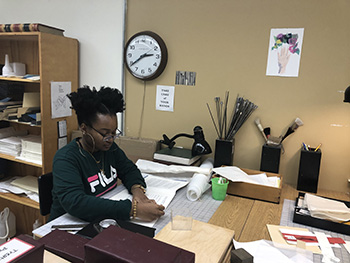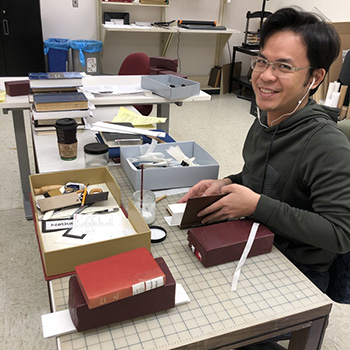Librarians at Work: Nora Bloch on preservation

This article was written by Catalina Currier, a member of the Cabell Library Undergraduate Advisory Committee.
When you think of preservation, do you think of the cover ripped off your well-loved childhood novel or the spilled coffee on your textbook? What about the notes you take in the margins or mold on a forgotten book in the basement? How about school notes from the 1940’s or letters your grandmother sent your grandfather before they married?
Library preservation is similar to archaeology in that all materials, even books, can tell a variety of stories as artifacts from a given time and place. “There is culture to preserve anywhere you go, if you pay attention and attribute value to it,” said Nora Bloch, VCU Libraries Preservation Librarian. Much of the work of preservation is caring for and maintaining this culture so that it remains accessible for the future.
As in many professions, a preservation librarian isn’t necessarily a job you know exists when you start university. Bloch started with no knowledge, taking a book making class just for fun, but ended up falling in love with the profession. She studied archaeology, taught letterpress and worked in the library conservation lab during her first master’s program. After a year as a rare bookseller in Los Angeles, she moved to Spain, then England to study for a master’s degree in Conservation Studies and eventually found her way to VCU.

Bloch started at VCU Libraries in April, 2019, and has been bringing the preservation program back into the light after a short hiatus due to the retirement of a longtime preservation head. She says, “Along with acquiring collections, we are also responsible for caring for these materials to assure that they will remain accessible to our community. This requires a great deal of help from everyone who works in the library or uses the materials.” She uses data loggers to monitor the temperature and relative humidity in the libraries, because the environment in which collections are stored is by far the most important aspect of preservation. “Preservation efforts encompass the care of all formats,” says Bloch. Megan Goldfarb, a Collections Specialist at Cabell, even helps collections care by doing acidity tests on 16mm films and microfilm to check their degree of deterioration.
Caring for collections from Cabell Library, Tompkins-McCaw Library for the Health Sciences, and the libraries’ storage facility in the 500 Academic Center, she worked with three student Collections Care Technicians and three library staff members (before the libraries’ closure), training them to identify and repair damaged materials. Kierra Young, a pre-dental first-year student had been working in the collections care lab since September. “It’s an opportunity to learn through trial and error, and the atmosphere is so welcoming,” says Young as she uses a scalpel to scrape and smooth the inside of the cover before gluing the book’s endpapers back down. Dental tools used to repair books are the same ones she will use as a dental student.
Preservation in the lab can range from rebacking or recasing a book, repairing the spine, removing tape, erasing pencil marks, adhering labels, making enclosures, or fixing loose or missing pages. Materials from the shelves of the library, donated books, and those rare books housed in Special Collections and Archives require such care.

One of the few faculty and staff going into the buildings through the first week of April, Bloch visited the campus twice weekly to conduct inspections of the libraries, Special Collections and Archives to prepare for a full closure. She remains on-call to recover collections, partnering with facilities staff who do weekly walkthroughs, in case leaks occur where collections are stored. Since the libraries’ recent closure, Bloch works from her home workshop, taking breaks from her computer screen to repair books.
Bloch is also preparing for Preservation Week – Oral Histories (April 26-May 2) with Erin Bragg, an Information Associate at Cabell, which “promotes the role of libraries and other institutions in preserving personal and public collections and treasures,” according to the American Library Association. You can be proactive in preserving your own collections by taking care of them and storing them in cool, dry places. Our narratives as members of the VCU community are powerful, and if we preserve important items of record now, they will become our legacy for future generations.
Interested in a discussion about protecting the libraries’ valuable collection of books, artifacts and art? Want to learn how to preserve family treasures and documents? Bloch will conduct a free Zoom workshop May 30.
Categories Collections, Community, E-news, Events, preservation